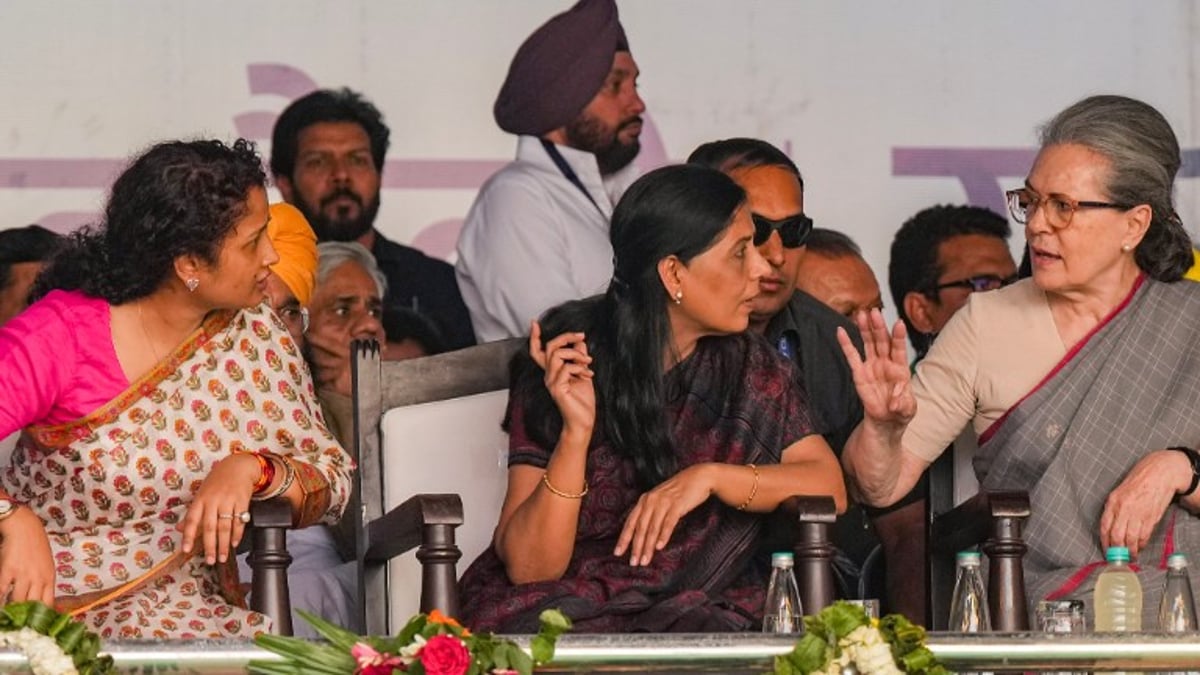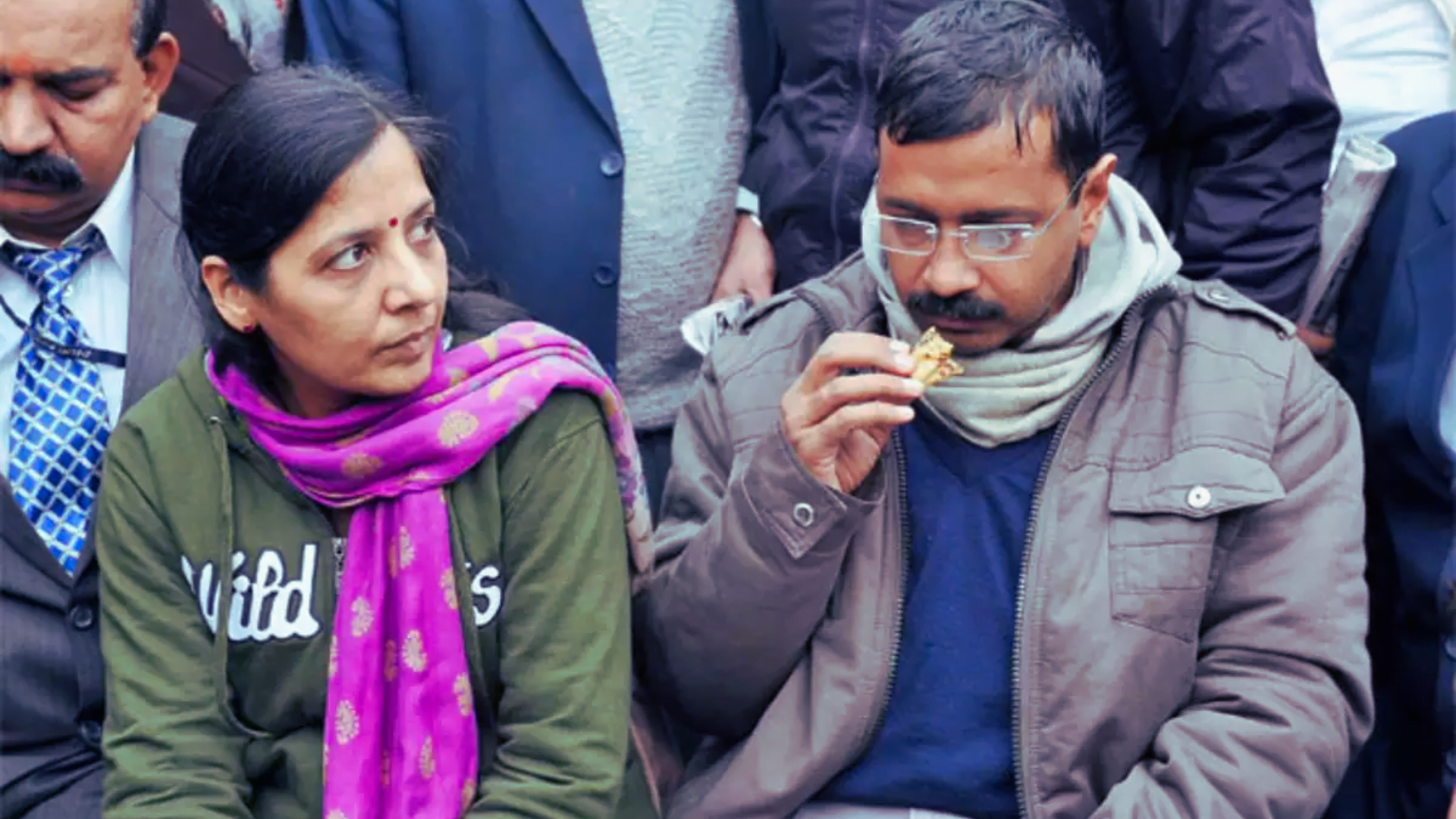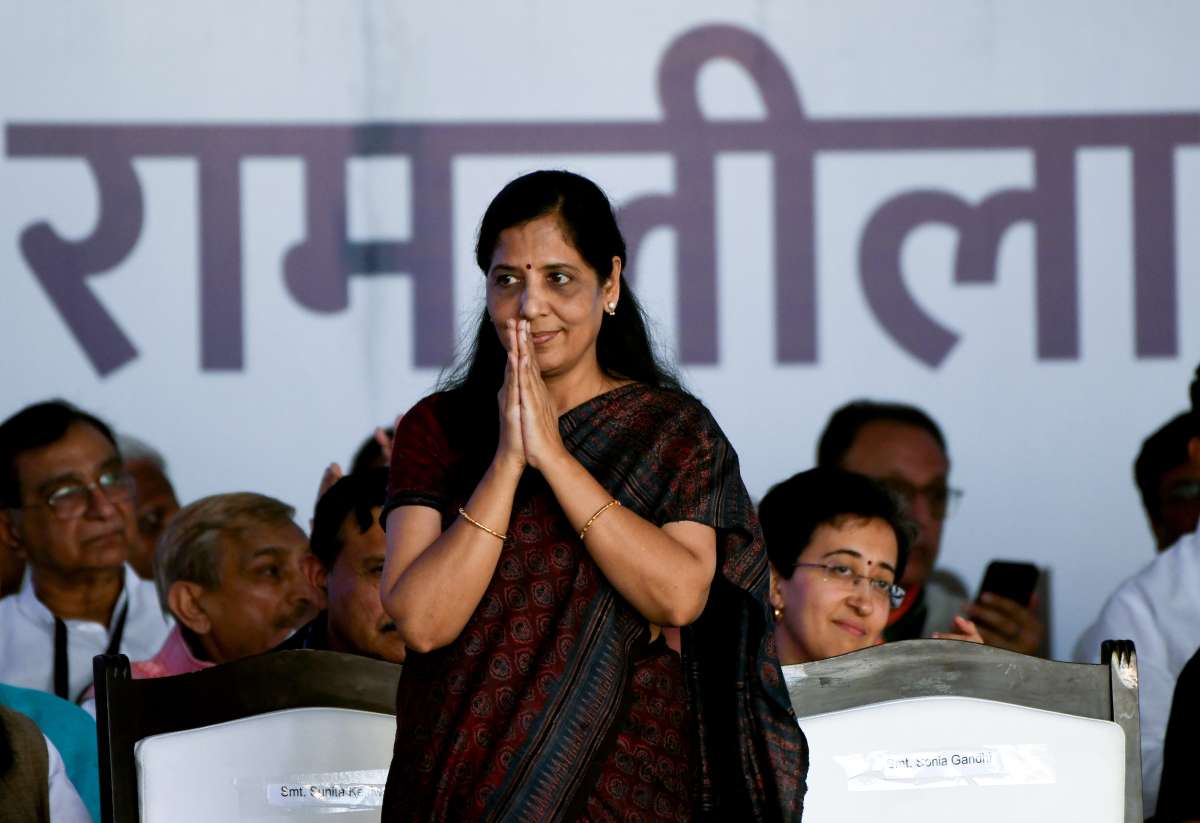The arrest of Arvind Kejriwal, Delhi’s Chief Minister, by the Enforcement Directorate in connection with the Delhi liquor policy case, has sent shockwaves through the political corridors of the capital city. Kejriwal, a towering figure in Indian politics renowned for his anti-corruption crusades, finds himself entangled in a legal web, prompting widespread speculation about the ramifications for governance in Delhi. As the legal saga unfolds, concerns loom large over the potential fallout on both the administrative machinery and the reputation of the Aam Aadmi Party (AAP), which Kejriwal leads with fervor. Amidst this tumultuous scenario, the spotlight inevitably shifts towards Sunita Kejriwal, Arvind’s steadfast companion, whose presence offers a semblance of stability and potential leadership amidst the turmoil.
Sunita Kejriwal, hitherto known for her reserved demeanor in public affairs, now finds herself thrust into the limelight within the AAP and Delhi’s political arena.
Sunita Kejriwal, hitherto known for her reserved demeanor in public affairs, now finds herself thrust into the limelight within the AAP and Delhi’s political arena. Her sudden emergence is marked by impassioned video addresses on behalf of the AAP, where she staunchly stands by her husband while lambasting the actions of the Modi government. These impassioned addresses have ignited fervent discussions about Sunita’s aptitude for assuming leadership roles within the party and potentially as the Chief Minister of Delhi, catapulting her into a new role as a vocal advocate and political luminary. With her background as an Indian Revenue Service (IRS) officer and a reputation for unwavering integrity, Sunita’s influence within the AAP has surged significantly, commanding attention and respect.
The metamorphosis of Sunita Kejriwal from a behind-the-scenes supporter to a visible political figure mirrors broader shifts unfolding within the AAP and the Indian political landscape at large. Her active engagement in political discourse has elicited both admiration and scrutiny, raising pertinent questions about the implications of dynastic politics and gender dynamics in the trajectory of leadership succession. Sunita’s potential ascent to a prominent political pedestal in Delhi underscores the evolving role of women in Indian politics and the nuances of navigating public life amidst intricate legal and ethical quandaries. Moreover, it underscores the intrinsic value of meritocracy and individual capabilities in the selection and evaluation of leaders, transcending traditional paradigms.
As Sunita Kejriwal assumes a more conspicuous role within the AAP and Delhi’s political landscape, she grapples with an array of legal and ethical dilemmas. Questions surrounding potential conflicts of interest and her entanglement in ongoing investigations add layers of complexity to her newfound prominence. Balancing these intricate challenges while upholding personal integrity and public trust poses a formidable test for Sunita as she continues to tread the path of public scrutiny. Additionally, the heightened scrutiny she faces underscores the pressing need for transparency and accountability in political leadership, particularly during times of upheaval and uncertainty.
Sunita Kejriwal: from supporter to advocate
Sunita Kejriwal’s emergence as a potential torchbearer reflects broader shifts unfolding within Indian politics, where individuals are increasingly evaluated based on their intrinsic merits rather than mere familial affiliations. However, her ascendancy also casts a spotlight on persistent gender disparities and societal expectations confronting women in positions of power. As Sunita embarks on this new chapter of her public life, she serves as a symbol of the evolving role of women in Indian politics and the complexities inherent in leadership transitions amid crisis. Furthermore, her leadership potential challenges entrenched gender norms.
As Sunita embarks on this new chapter of her public life, she serves as a symbol of the evolving role of women in Indian politics and the complexities inherent in leadership transitions amid crisis.
In the backdrop of legal battles and leadership tumults shaping Delhi’s political landscape, the trajectory of Sunita Kejriwal’s political odyssey remains shrouded in uncertainty. Her potential elevation to leadership echelons within the AAP and Delhi’s governmental apparatus underscores the fluidity and intricacy of leadership dynamics in Indian politics. Furthermore, it underscores the exigency for nuanced understandings of gender dynamics and political succession paradigms in contemporary society. Irrespective of the denouement, Sunita’s foray into the political arena has sparked crucial dialogues about representation and empowerment, laying the groundwork for fostering more inclusive and equitable governance frameworks.
The ascent of Sunita Kejriwal as a formidable figure within the AAP and Delhi’s political panorama heralds a significant paradigm shift with far-reaching ramifications. By dissecting the myriad challenges and opportunities confronting her, this discourse endeavors to furnish insights into the evolving tapestry of Indian politics and the evolving role of women in positions of authority. As Sunita navigates the labyrinthine corridors of public life, her journey serves as a mirror reflecting broader societal transformations and political vicissitudes sweeping across Indian society. Moreover, it underscores the imperativeness of acknowledging and nurturing diverse leadership perspectives to engender more inclusive and effective governance paradigms in the contemporary epoch.
Amidst the unfolding political drama, it’s essential to acknowledge the crucial role that Sunita Kejriwal’s leadership potential plays in shaping the narrative of gender equity and inclusivity in Indian politics. Her emergence as a frontrunner for leadership positions within the AAP underscores the pressing need for dismantling entrenched patriarchal structures and fostering environments conducive to women’s participation and empowerment in governance. Moreover, her ability to navigate the intricate web of legal challenges and ethical dilemmas while upholding integrity and transparency sets a powerful precedent for future leaders, irrespective of gender. As Sunita continues to chart her course in the turbulent waters of Indian politics, her journey serves as a beacon of hope for a more equitable and representative political landscape.
The emergence of wives of politicians into the public eye, particularly when their husbands are absent due to legal or political reasons, raises intriguing questions about the dynamics of power, gender roles, and public perception. This phenomenon, often characterised by wives stepping in to fulfill leadership roles or make public statements on behalf of their husbands, reflects broader societal norms and expectations surrounding gender and leadership.
Navigating legal quandaries and leadership dynamics
Historically, the role of the politician’s wife has been largely relegated to the background, with expectations centered around providing support to their husbands’ careers while maintaining a low profile in public affairs. However, when circumstances dictate, such as in the case of a husband’s absence due to legal troubles or political obligations, wives may find themselves thrust into the spotlight, assuming a more prominent and active role in the public sphere.
While some may view this as a natural extension of spousal support and solidarity, others may perceive it as a calculated strategy to maintain political influence or preserve family legacies. The sudden visibility of wives in the absence of their husbands can evoke mixed reactions from the public, ranging from admiration for their strength and resilience to skepticism about their motives and qualifications.
Moreover, the phenomenon raises pertinent questions about gender equality and representation in politics. The fact that wives are often called upon to fill the void left by their husbands underscores the persistent gender disparities in political leadership and the limited opportunities for women to assume leadership roles independently of their spouses.
At the same time, the emergence of wives into the public sphere can challenge traditional gender norms and expectations, offering a glimpse into the evolving dynamics of power and influence within political families. It can also provide an opportunity for wives to showcase their own capabilities, expertise, and leadership potential, independent of their husbands’ reputations or achievements.
Ultimately, the phenomenon of wives of politicians stepping into the forefront in their husbands’ absence serves as a microcosm of larger societal debates surrounding gender, power, and representation.
Ultimately, the phenomenon of wives of politicians stepping into the forefront in their husbands’ absence serves as a microcosm of larger societal debates surrounding gender, power, and representation. It highlights the complexities of navigating public life as a political spouse and raises important questions about the role of gender in shaping leadership dynamics and opportunities. As the political landscape continues to evolve, so too will the ways in which spouses of politicians are perceived and engaged in the public sphere.
In the end, the phenomenon of wives of politicians stepping into leadership roles offers us a mirror through which we may contemplate the essence of power, the fluidity of gender roles, and the enduring quest for a more just and equitable society. It beckons us to ponder not only the present moment but also the timeless aspirations that drive humanity towards progress and enlightenment.
About the author(s)
Nidhi Singh is a student-researcher based in Delhi, currently pursuing a degree in International Relations at the South Asian University. She holds a first-class degree in Political Science from Hindu College, Delhi University. Nidhi’s research passions encompass Feminism, the Global Economy, and Artificial Intelligence. She is an avid reader, staying well-informed about global events and aspires to actively contribute to academic dialogues and discussions. Nidhi distinguishes herself with her comprehensive writing and analytical skills










Very well written
Insightful piece, Nidhi! Keep writing! xx